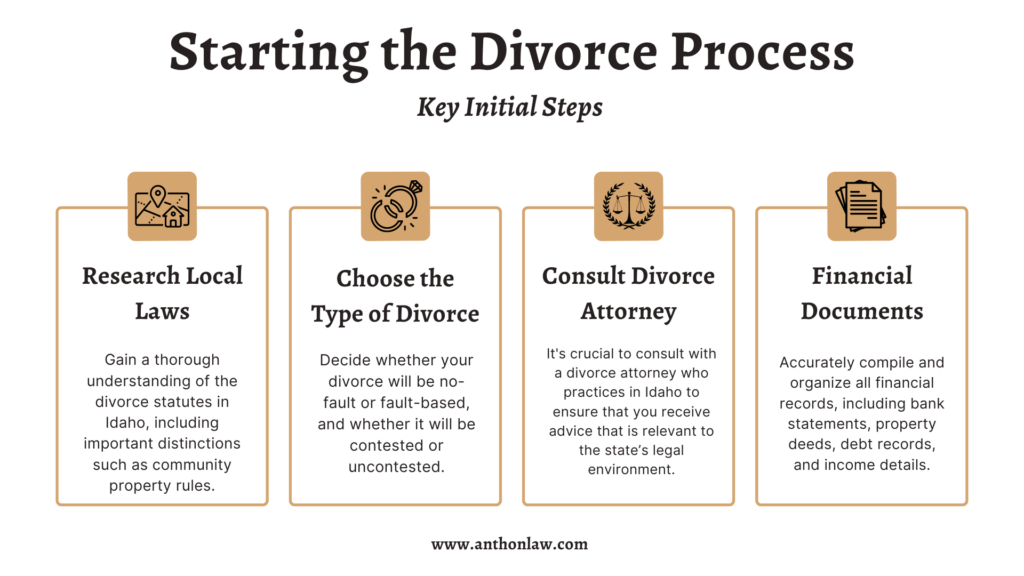Guide to Planning for Divorce
Divorce, a complex process, is not just about complexities and emotional challenges. It also signifies the end of a difficult chapter and the potential for a brighter future. Navigating the dissolution of a marriage can be emotionally taxing as individuals confront feelings of loss, uncertainty, and significant changes in their personal and family dynamics. From understanding state laws and managing finances to making custody arrangements, further compound the emotional strain. However, it’s important to remember that this will all bring relief and hope for a better tomorrow.
Given these complications, it is vital for those considering divorce to be well-informed and adequately prepared. This knowledge empowers individuals, enabling them to make more thoughtful decisions, manage the emotional upheaval more effectively, and set a course for a more stable and fulfilling post-divorce life. The more you know, the more in control you’ll feel.
Types of Divorces
Divorce can be broadly categorized into uncontested and contested types, reflecting the degree of agreement between the parties involved. In an uncontested divorce, both spouses agree on all major aspects, such as asset distribution, debt handling, and custody arrangements, which can lead to a smoother and often quicker finalization process. In contrast, a contested divorce arises when spouses cannot resolve one or more issues, such as asset distribution or child custody, requiring legal intervention to settle disputes. This often leads to a longer and more complex legal process.
No-fault divorces do not require the demonstration of wrongdoing by either spouse and are based on reasons such as irreconcilable differences or irretrievable breakdown of the marriage. This means that the divorce is not based on one party’s fault but rather on the fact that the marriage is no longer working. Fault-based divorces, however, are filed because they might include adultery, abandonment, or abuse and require proof of these allegations. These types of divorces can be more complex and emotionally challenging.
The typical divorce process involves several steps: filing a petition, serving the petition to the other spouse, responding, negotiation, trial (if necessary), and finally, the issuance of a divorce decree by the court, legally ending the marriage. Each stage demands careful consideration and, often, legal counsel.

Financial Implications
When contemplating divorce, it’s necessary to thoroughly assess your financial health and prepare for the impact on your finances, both during and after the process. Managing the financial aspects of divorce can considerably influence your stability moving forward.
- Assessing Financial Health: Begin by inventorying all joint assets and debts. This includes everything from bank accounts, investments, and property to credit card debts and loans.
- Impact on Finances: Divorce can affect various aspects of your finances, including your credit score, eligibility for housing, and overall living standards. Understanding how splitting assets, taking on individual debts, and the costs of legal proceedings can alter your financial landscape is crucial.
- Budgeting Post-Divorce: Adjusting to a single-income household necessitates careful budgeting. Plan your finances to accommodate changes in household income and expenses. Consider the need for, or adjustments to, emergency funds, retirement savings, and daily living expenses to maintain financial health post-divorce.
Why Get Legal Assistance
For residents of Idaho contemplating divorce, consider hiring a lawyer, especially given the specific legal landscape, to make sure that your rights and interests are adequately represented. Legal counsel becomes necessary to interpret Idaho’s distinctive family laws, manage complex asset divisions, or handle custody disputes effectively. Additionally, Idaho offers alternatives like mediation and arbitration, which can provide a less adversarial and often more cost-effective resolution to divorce proceedings than traditional court battles.
These methods allow both parties to negotiate terms more amicably and privately, with the help of a neutral third party. Understanding Idaho’s specific divorce statutes, such as those governing the division of property (Idaho is a community property state), child support, and alimony, is essential as they substantially influence the outcomes of divorce proceedings. Engaging a legal professional familiar with Idaho law can help streamline the process, mitigate emotional stress, and ensure that the final agreement is fair and compliant with state regulations.

Emotional Considerations
Divorce is an emotional event that often mirrors the stages of grief, encompassing denial, anger, bargaining, depression, and acceptance. Recognizing these emotional stages can help individuals cope more effectively by recognizing that their feelings are normal and transient.
Additionally, if children are involved, it’s key to prioritize their well-being by maintaining routine and stability, being honest about the situation in an age-appropriate manner, and shielding them from conflict. Practices such as effectively co-parenting, avoiding disparaging the other parent in front of the children, and ensuring open lines of communication about their feelings can minimize their stress and help maintain a sense of security throughout the divorce process.
Common Pitfalls to Avoid
It’s OK to make mistakes, but it’s always best to avoid them if possible. Here are some common issues we see people make when it comes to the divorce process:
- Consult a Lawyer: Get legal advice early to understand your rights.
- Follow Advice: Adhere strictly to your lawyer’s guidance.
- Communicate with Children: Keep open, age-appropriate discussions with your kids.
- Maintain Stability: Strive to keep your children’s daily routines consistent.
- Seek Therapy: Consider professional counseling for emotional support.
- Reflect Before Acting: Pause to consider the long-term impact of your decisions.

Planning for the Future
Rebuilding after a divorce involves several steps to guarantee emotional and financial recovery.
Firstly, engage in self-care and possibly seek therapy to address emotional healing. Secondly, effective co-parenting is crucial; establish clear communication and consistent parenting plans with your ex-spouse to support your children’s well-being. Finally, revisit your financial goals: reevaluate your budget, savings, and investment strategies to secure your long-term financial health.
If you need professional guidance, reach out to Brett Anthon for compassionate legal counsel.





